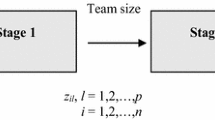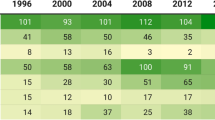Abstract
Summer Olympic games in Rio 2016 were the biggest and the most important sport event in 2016. Athletes’ performance at Olympics is always of a high interest and serve as a basis for various parametric and non-parametric analyses. In this article, we construct data envelopment analysis model to analyze countries’ performance in Summer Olympic games in Rio 2016. The traditional model structure is based on GDP-population theory. In this article, we go beyond this traditional model structure and introduce economic active population and corruption factors into the model. Similarly, the Olympic success is measured regarding medal ranking of each country. Nevertheless, we enlarge traditional golden, silver and bronze medals output structure, including medal ranking up to 8th position. This model structure enables us to also measure performance of lower performed countries that are traditionally not ranked in the medal rankings. As a complement to the achieved results, we decompose the results regarding World Bank’s income classification to be able to make conclusion of countries’ performance.

Similar content being viewed by others
Notes
The International Olympic Committee. 2011. IOC awards US broadcast rights for 2014, 2016, 2018 and 2020 Olympic Games to NBCUniversal. Available at https://www.olympic.org/news/ioc-awards-us-broadcast-rights-for-2014-2016-2018-and-2020-olympic-games-to-nbcuniversal (accessed December 2, 2016).
McCready, R. 2016. For Olympic Athletes, Is 30 the New 20? Available at https://venngage.com/blog/olympics/ (accessed December 26, 2016).
Trading Economics. 2016. Available at http://www.tradingeconomics.com/north-korea/gdp (accessed October 15, 2016).
Kosovo Agency of Statistics, available at http://ask.rks-gov.net/en/ (accessed October 15, 2016).
Detailed methodology is available at: https://datahelpdesk.worldbank.org/knowledgebase/articles/378832-what-is-the-world-bank-atlas-method (accessed October 28, 2016).
References
Rio. Rio 2016—athletics schedule and results. https://www.rio2016.com/en/athletics-schedule-and-results-download (2016). Accessed 21 Sept 2016
Müller, M.: What makes an event a mega-event? Definitions and sizes. Leisure Stud. 34(6), 627–642 (2015). https://doi.org/10.1080/02614367.2014.993333
Kasimati, E., Dawson, P.: Assessing the impact of the 2004 Olympic Games on the Greek economy: a small macroeconometric model. Econ. Model. 26(1), 139–146 (2009). https://doi.org/10.1016/j.econmod.2008.06.006
Atkinson, G., Mourato, S., Szymanski, S., Ozdemiroglu, E.: Are we willing to pay enough to ‘back the bid’? Valuing the intangible impacts of London’s bid to host the 2012 Summer Olympic Games. Urban Stud. 45(2), 419–444 (2008). https://doi.org/10.1177/0042098007085971
Walton, H., Longo, A., Dawson, P.: Contingent valuation of 2012 London Olympics: a regional perspective. J. Sports Econ. 9(3), 304–317 (2008). https://doi.org/10.1177/1527002507308769
End, C.M., Dietz-Uhler, B., Harrick, E.A., Jacquemotte, L.: Identifying with winners: a reexamination of sport fans’ tendency to BIRG. J. Appl. Soc. Psychol. 32, 1017–1030 (2002)
Davis, M.C., End, ChM: A winning proposition: the economic impact of successful National Football League franchises. Econ. Inq. 48(1), 39–50 (2010)
Lozano, S., Villa, G., Guerrero, F., Cortés, P.: Measuring the performance of nations at the Summer Olympics using data envelopment analysis. J. Oper. Res. Soc. 53(5), 501–511 (2002). https://doi.org/10.1057/palgrave/jors/2601327
Li, Y., Lei, X., Dai, Q., Liang, L.: Performance evaluation of participating nations at the 2012 London Summer Olympics by a two-stage data envelopment analysis. Eur. J. Oper. Res. 243(3), 964–973 (2015). https://doi.org/10.1016/j.ejor.2014.12.032
Li, Y., Liang, L., Chen, Y., Morita, H.: Models for measuring and benchmarking Olympics achievements. Omega 36, 933–940 (2008). https://doi.org/10.1016/j.omega.2007.05.003
Zhang, D., Li, X., Meng, W., Liu, W.: Measuring the performance of nations at the Olympic Games using DEA models with different preferences. J. Oper. Res. Soc. 60(7), 983–990 (2009). https://doi.org/10.1057/palgrave.jors.2602638
Wu, J., Liang, L., Yang, F.: Achievement and benchmarking of countries at the Summer Olympics using cross efficiency evaluation method. Eur. J. Oper. Res. 197, 722–730 (2009). https://doi.org/10.1016/j.ejor.2008.06.030
Churilow, L., Flitman, A.: Towards fair ranking of Olympic achievements: the case of Sydney 2000. Comput. Oper. Res. 33, 2057–2082 (2006). https://doi.org/10.1016/j.cor.2004.09.027
Bernard, A.B., Busse, M.R.: Who wins the Olympic games: economic resources and medal totals. Rev. Econ. Stat. 86(2), 413–417 (2004). https://doi.org/10.1162/003465304774201824
Vagenas, G., Vlachokyriakou, E.: Olympic medals and demo-economic factors: novel predictors, the ex-host effect, the exact role of team size, and the “population-GDP” model revisited. Sport Manag. Rev. 15(2), 211–217 (2012). https://doi.org/10.1016/j.smr.2011.07.001
Potts, T.: Governance, corruption and Olympic success. Appl. Econ. 46(31), 3882–3891 (2014). https://doi.org/10.1080/00036846.2014.948672
Masters, A.: Corruption in sport: from the playing field to the field of policy. Policy Soc. 34, 111–123 (2015). https://doi.org/10.1016/j.polsoc.2015.04.002
Transparency International. 2016. Global corruption report: sport. Routledge. ISBN: 978-1-315-69570-9. http://www.transparency.org/news/feature/sport_integrity. Accessed 25 Nov 2016
Graycar, A.: Corruption: classification and analysis. Policy Soc. 34, 87–96 (2015). https://doi.org/10.1016/j.polsoc.2015.04.001
Gorse, S., Chadwick, S.: The prevalence of corruption in international sport: a statistical analysis. Centre for the International Business of Sport, Coventry. http://www.egba.eu/pdf/Report-FINAL.pdf (2011). Accessed 1 Dec 2016
Cooper, W.W., Seiford, L.M., Zhu, J.: Handbook on Data Envelopment Analysis. International Series in Operations Research & Management Science, vol. 164, 2nd edn. Springer, Berlin (2011). https://doi.org/10.1007/978-1-4419-6151-8
Charnes, A., Cooper, W.W., Rhodes, E.: Measuring the efficiency of decision making units. Eur. J. Oper. Res. 2(6), 429–444 (1978). https://doi.org/10.1016/0377-2217(78)90138-8
Sexton, T.R., Silkman, R.H., Hogan, A.J.: Data Envelopment Analysis: Critique and Extensions. Measuring Efficiency: An Assessment of Data Envelopment Analysis, vol. 32, pp. 73–105. Jossey-Bass, San Francisco (1986)
World Bank.: World Bank open data. World Bank. http://data.worldbank.org/ (2016). Accessed 15 Oct 2016
Transparency International.: Corruption Perception Index. http://www.transparency.org/research/cpi/ (2016). Accessed 10 Oct 2016
Andrade Rosas, L.A., Flegl, M.: Quantitative and qualitative impact of GDP on sport performance and its relation with corruption and other social factors. Nóesis Revista de Ciencias Sociales y Humanidades 28(55), 15–37 (2019). https://doi.org/10.20983/noesis.2019.1.2
Flegl, M., Andrade, L.: Rio 2016—Olympic Sport Economic Data (2016). https://doi.org/10.6084/m9.figshare.4272200
Acknowledgements
The authors would like to thank to La Salle University in México City, Mexico for the support in carrying out this work, which was done under university grant projects.
Author information
Authors and Affiliations
Corresponding author
Rights and permissions
About this article
Cite this article
Flegl, M., Andrade, L.A. Measuring countries’ performance at the Summer Olympic Games in Rio 2016. OPSEARCH 55, 823–846 (2018). https://doi.org/10.1007/s12597-018-0347-8
Accepted:
Published:
Issue Date:
DOI: https://doi.org/10.1007/s12597-018-0347-8




